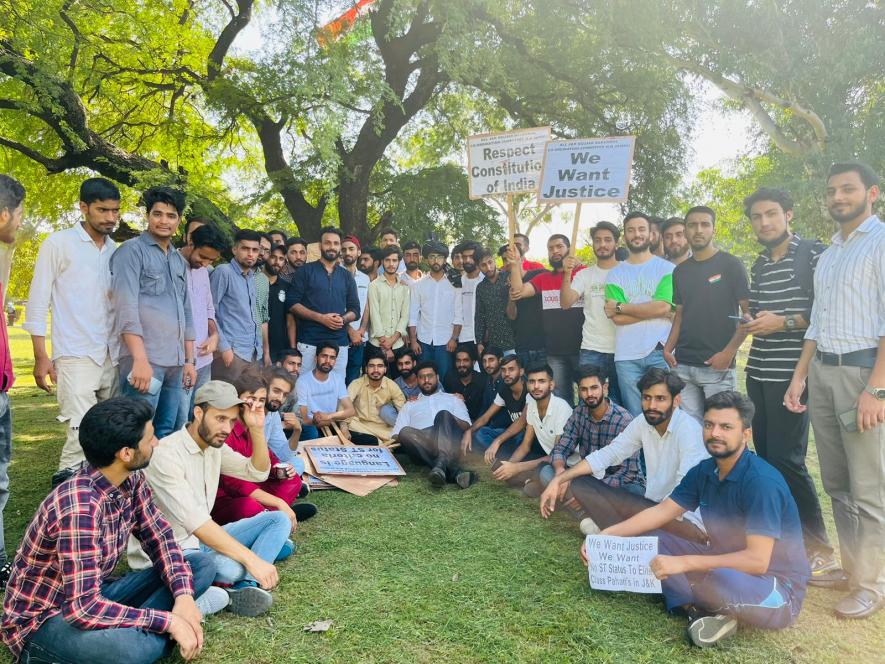
Srinagar: Members of the Gujjar and Bakerwal communities have launched protests across Jammu and Kashmir ahead of Union Home Minister Amit Shah’s visit to the region. The communities are apprehensive that Shah may announce Schedule Tribe status for the Pahari community, which the former claim will lead to ‘dilution’ of the reservation.
Representatives, students and community activists from the Gujjar and Bakerwal community, who fall in the Schedule Tribe (ST) category, took to the streets and carried out several rallies in several areas of Kashmir valley, parts of Chenab valley and Pir Panjal areas. The community members argue that Gujjar and Bakerwal communities are not only socially, economically and politically backwards but also face social stigmatisation, which the Pahari community does not have to deal with. They have called for a valley-wide mobilisation to peacefully protest for what they referred to as the “protection of reservation rights.”
Shah is visiting the region for two days from October 4. The Pahari community is hopeful that the Home Minister will announce ST status for them during his rally in the Rajouri area of Jammu, which has a significant Pahari-speaking population. The demonstrators have said they will continue their protest during Shah’s visit.
Faisal Raza Bokda, the provincial president of the Gujjar Bakarwal Youth Welfare Conference J&K (JKGBYWC) in Jammu, said that the Pahari community does not fit the criteria of being a Scheduled Tribe.
“It (the ST status) was granted to us after a long struggle by the community and its leaders in 1990. The Paharis did not fulfil the standards and were hence left out, and there was no demand as such during that time. Now that there is a political reservation, which was announced during the delimitation process, some of the Pahari leaders have began demanding it,” Faisal told NewsClick.
Gujjar and Bakerwals have a 7.5% reservation under the ST category, which they also share with other communities like Shinas. The young activist also argued that anyone who lives in the mountains could claim Pahari status, and the community already enjoys reservations in several categories, making the fresh demand “unjustified”.
“They have 40% reservation across different categories, and there is also a 4% reservation under PSP (Pahari Speaking Population) even as there are no reservations given on the basis of language,” he said.
Faisal pointed out that if the government increases their percentage under these reservations, the Paharis will have no problem, but including them in the ST reservation will impact other communities.
According to the 2011 Census, Gujjar and Bakerwals constitute as many as 15 lakh people in Jammu and Kashmir and were included as ST in 1992.
After the delimitation exercise was carried out in the aftermath of the abrogation of Articles 370 and 35A, the Delimitation Commission reserved nine assembly seats for the ST population. It included three assembly seats of Poonch, two out of five in Rajouri, and one each in Reasi, Anantnag, Ganderbal and Bandipore districts. Since then, the Pahari-speaking population, around 9% of the region’s total population, amplified their reservation demands.
The regional political parties have been backing the demands of the Pahari-speaking population, with many of the regional mainstream leadership calling it genuine. However, the conflict between the communities has caused concern among the parties urging the community leaders to end it.
Arguing that the issue has made enemies out of brothers and caused tension in the Pir Panjal region, former Chief Minister Mehbooba Mufti told reporters in Srinagar that the communities had lived together for centuries, and still, they are being pitted against each other.
“The Home Minister will come and leave. The BJP is here today, it will not be there tomorrow. First, they pitted Hindus against Muslims, and now they want the Gujjars and Paharis to fight with each other. It is forming a gulf between them. Your religion is one, you are the residents of the same place, so such fights should not happen,” Mufti, the president of the People’s Democratic Party (PDP), said.
Despite having reservations, the Gujjar and Bakerwal communities claim that they are facing harassment from the authorities as many of the members have been forcefully evicted from their residential areas since last year. Many have also accused the government of delaying the implementation of the Forests Rights Act (FRA) that empowers them.
Courtesy: Newsclick
